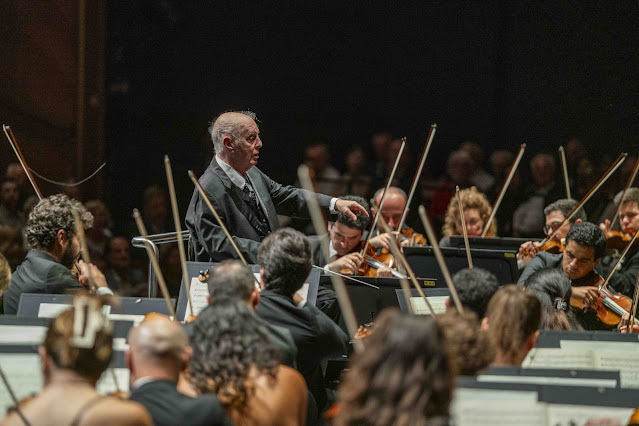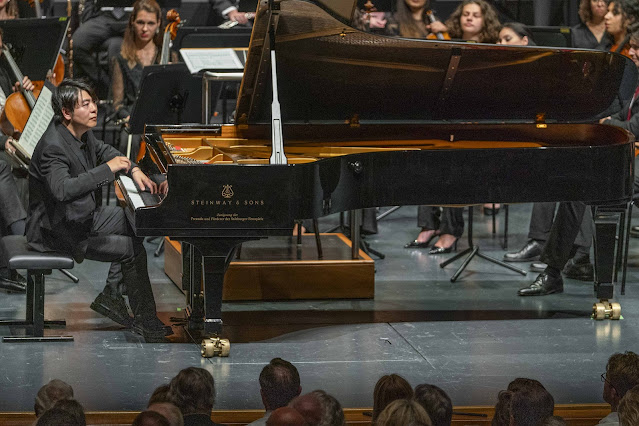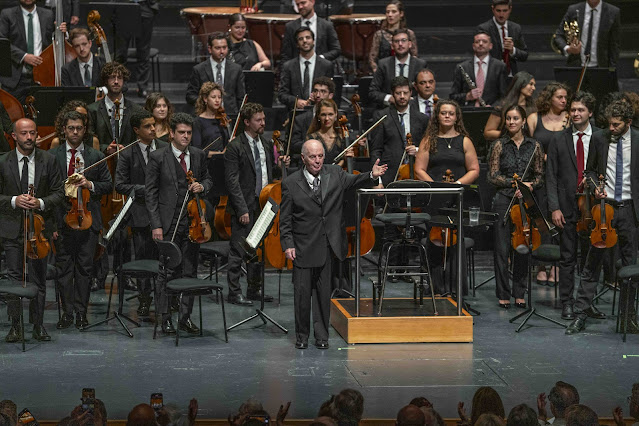 |
| Wagner: Siegfried Idyll – Daniel Barenboim, West-Eastern Divan Orchestra – Grosses Festspielhaus, Salzburg Festival (Photo: SF/Marco Borelli) |
Wagner: Siegfried Idyll, Mendelssohn: Piano Concerto No. 1 in G minor, Beethoven: Symphony No. 3 ‘Eroica’; Lang Lang, West-Eastern Divan Orchestra, Daniel Barenboim; Salzburg Festival at Grosses Festspielhaus, Salzburg
Reviewed 15 August 2025
Daniel Barenboim defies age and illness to conduct his orchestra in a programme full of prescient hints of today and in performance that reflected a lifetime of experience.
In February of this year, Daniel Barenboim announced that he was suffering from Parkinson’s Disease and as such his appearance with the West-Eastern Divan Orchestra at the Salzburg Festival on 15 August must seem something of a miracle. His progress across the platform of the Grosses Festspielhaus towards the podium was slow yet steady and inexorable, his eyes bright at the warm audience response. His West-Eastern Divan Orchestra has never felt so important and so pertinent.
There were few concessions to age or ill health in the evening. Barenboim conducted a substantial programme, Wagner’s Siegfried Idyll, Mendelssohn’s Piano Concerto No. 1, with soloist Lang Lang, and Beethoven’s Symphony No. 3 ‘Eroica’. It was an intriguing and surprisingly current programme that encapsulated the 19th century struggles with antisemitism and with overweening authority figures. It did not preach but it made you think.
 |
| Mendelssohn: Piano Concerto No. 1 – Lang Lang, Daniel Barenboim, West-Eastern Divan Orchestra – Grosses Festspielhaus, Salzburg Festival (Photo: SF/Marco Borelli) |
We began with Wagner, Barenboim conducting from memory. This was the large-scale symphonic version with a huge string section (many players would disappear for the Mendelssohn and reappear for the Beethoven). This was one of the most beautiful yet quiet performances of the work that I have come across. Barenboim and his players created an almost magical shimmer of sound and Barenboim’s tempos were never fleet. The wind solos were terrific, yet it was a performance that never raised its voice. The climax leading to Siegfried’s horn call (beautifully rendered) was slow burn, the ending intense yet never hurried.
Was Barenboim making a point? Certainly it was a hauntingly lovely account of a work that has become hackneyed. And the choice of tempo did not reflect a general slowing down by Barenboim as tempos in the remainder of the programme demonstrated.
Next came Mendelssohn’s Piano Concerto No. 1, written when he was just 21 yet by then a long-established composer with an impressive back catalogue. He was also a fine pianist and we can imagine the young man dazzling in the work. It had a certain ‘of its time’ feel, with the focus on the piano; for all Mendelssohn’s reverence for Beethoven the concerto gives no hint of Beethoven’s symphonic piano/orchestra struggles from his concertos.
The opening movement was fast and fizzy, Lang Lang clearly enjoyed the cascades and roulades in the piano, his fingerwork light and fleet. Yet for all the pianist’s elegance, we were aware that this was no lightsome work, the piano part is substantial and keeps going. The second subject was beautifully tender and this mood reappeared in the slow movement. Here Barenboim gave Lang Lang his head and the pianist took us to extremes of tempo and volume. He clearly loves the work but for me, he invested too much in it, in common parlance he ‘milked’ it, and you felt the young Felix Mendelssohn would have been no less tender but far brisker. Things recovered in the final movement which was perky and engaging with Lang Lang displaying quicksilver charm and yet more deft fingerwork.
How much was Barenboim and how much Lang Lang, I do not know. But certainly the conductor deferred to the soloist during the tumultuous applause and Lang Lang treated us to an encore, a Chopin waltz (I think!)
After the interval it was time for Beethoven’s Eroica Symphony. Barenboim’s performance was neither the fastest nor the slowest that I have heard. What there was, however, was a steady inexorability to the music, the long movements having a natural flow to them. Barenboim has always been a master of the large paragraph and here, with minimal movement, he drew his players along with him.
What the performance lacked, of course, was the sense of struggle that early performances would have had, the large scale and concept plus the challenges to the technology of instruments of the time. It is fatally easy to dismiss historically informed performances when faced with such a complete performance as this on modern instruments, but we should not forget that essential struggle.
The opening movement had a natural flow to the phrasing but full of strong detail in the accents along with an infectious energy, yet the music never got carried away with itself. There was an implacable feel to much of the movement yet there were moments of quiet magic. The musicians engagement with Barenboim made the performance compelling. The recapitulation felt completely new minted, and the crisp excitement of the coda was real slow build to the energy of the conclusion.
The second movement began dark and contained with the orchestra’s eight double basses really making themselves felt. The sombre mood set the scene for the soulful oboe solo and characterful woodwind. For all the moments of lyric tenderness, this movement too had a feeling of inexorability yet Barenboim also made us feel there was all the time in the world. A graceful quasi-trio seemed to herald the return of the opening but of course Beethoven moves us elsewhere with the intense fugue, here rendered in magnificently expansive manner. When things died away, Barenboim conjured an eerie near silence and for all the surprises Beethoven throws at us there was a natural feel to the way Barenboim shaped the music, as if it could not be any other way.
 |
| Mendelssohn: Piano Concerto No. 1 – Lang Lang, Daniel Barenboim, West-Eastern Divan Orchestra – Grosses Festspielhaus, Salzburg Festival (Photo: SF/Marco Borelli) |
The scherzo was quiet, fast and intense with suppressed excitement that became vivid indeed, and a trio featuring some exciting horn playing. The finale began with controlled energy and more suppressed excitement, really playing into the way Beethoven gives just the bones of what he fleshes out later. This process featured plenty of crisp detail and infectious energy leading to an expansive version of the main theme. As Beethoven put the music through its paces, challenging both us and the players, Barenboim made the argument seem inevitable, allowing the music the time and space it needed. And when we did reach our destination, Barenboim and is players went out with horns blazing.
The blog is free, but I’d be delighted if you were to show your appreciation by buying me a coffee.
Elsewhere on this blog
- Salzburg Festival
- Youthful tragedy & transcendental mystery: Riccardo Muti & Vienna Philharmonic Orchestra in Schubert & Bruckner – concert review
- Strange & intriguing: Dmitri Tcherniakov directs his first Baroque opera with Handel’s Giulio Cesare – opera review
- Going where no other company has dared: Green Opera gives the stage premiere of Joubert’s Jane Eyre at Grimeborn Festival – opera review
- New challenge & new repertoire: trumpeter Matilda Lloyd her new disc, Fantasia, pairing contemporary pieces with Baroque – interview
- I Shall Hear In Heaven: Tama Matheson impressively incarnates Beethoven with music alongside the spoken word – music theatre review
- BBC Proms: Classics, bon-bons & an engagingly fresh account of a masterpiece, Nil Venditti conducts BBC NOW – concert review
- Bayreuth Festival: Thorliefur Örn Arnarsson’s interpretation of Tristan und Isolde is a well-planned and thoughtful affair – opera review
- All-consuming: Kateřina Kněžíková’s account of the title role lights up Damiano Michieletto’s overly conceptual production of Janáček’s Káťa Kabanová at Glyndebourne – opera review
- BBC Proms – Arvo Pärt at 90: Estonian Philharmonic Chamber Choir, Tõnu Kaljuste – concert review
- Baltic Tides: piano music by two important Baltic pianist composers, Lūcija Garūta & Ester Mägi makes for a marvellous, compelling disc – record review
- Home








